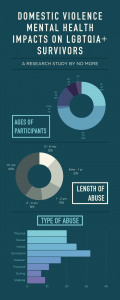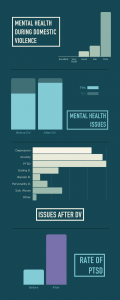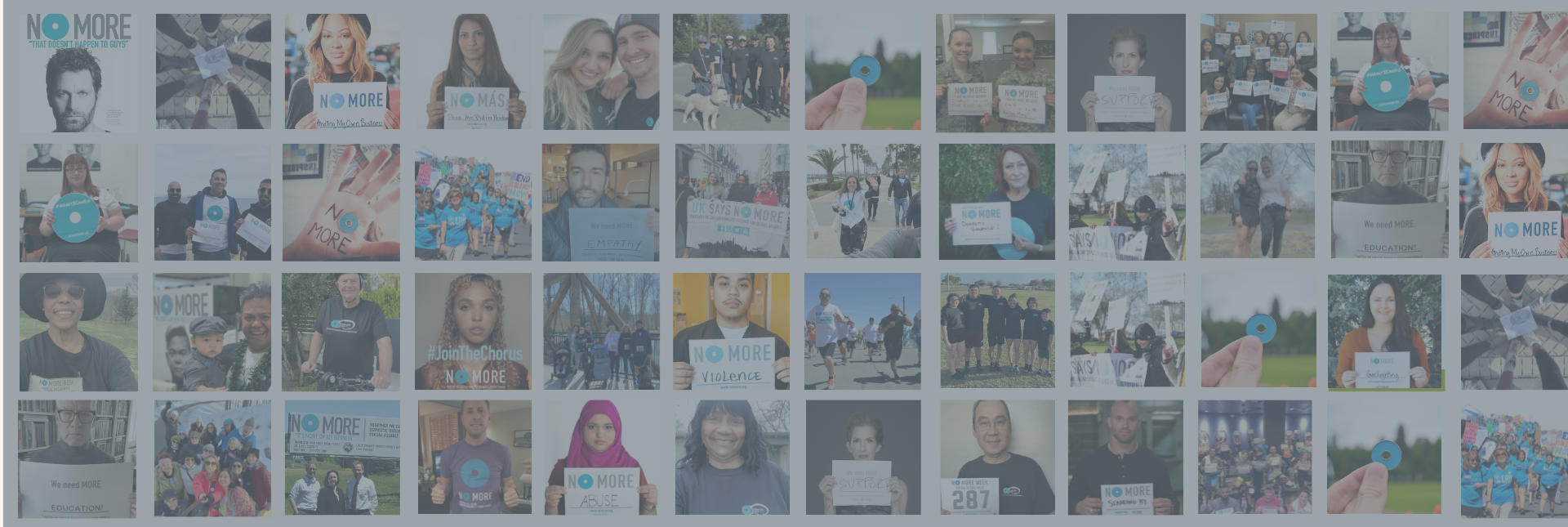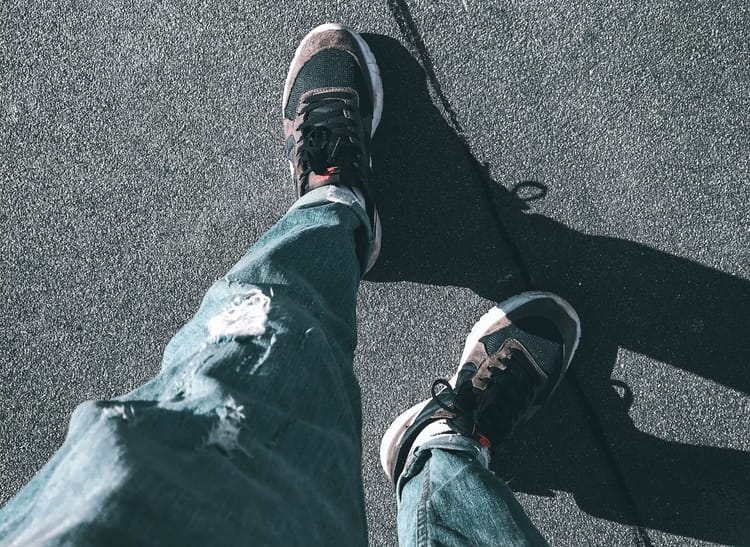NO MORE Intern Mel Holman—Domestic Violence Impacts on the Mental Health of LGBTQIA+ Survivors


''Everyone, regardless of their gender or sexual orientation, deserves to receive the help that they need after experiencing abuse''.
I had the pleasure of interning for NO MORE during the Fall 2020 semester of my senior year at Arizona State University. Joining during October, I had the opportunity to work on many meaningful projects for Domestic Violence Awareness Month, 16 Days of Activism, Giving Tuesday, and much more. While researching the many statistics and information about domestic violence, one thing stood out to me: there was little information about abuse and its mental health impacts in the LGBTQIA+ community. As a psychology major and a member of the LGBTQIA+ community, I decided to dive deeper into the intersection of domestic violence and mental health.
As part of this community, I am all too aware of being left out of various conversations; it can be challenging at times. Exclusion from domestic violence conversations creates a lack of knowledge on the topic. Without the proper knowledge, it can be more difficult for sufferers to be aware that they are being abused. Individuals lacking knowledge can then end up staying in the situation or even treat future partners similarly. Exclusion from domestic violence conversations can also create feelings of hopelessness. A person can feel stuck in a situation because they might think that there is no help for them. Inclusion and awareness make all the difference.
For LGBTQIA+ individuals experiencing domestic violence, many questions can arise, such as:
- What programs can I go to for help that will accept me?
- Will the people in my life who disapprove of me offer help?
- I'm not out; what do I do?
- Is what I'm experiencing actually domestic violence?
- If a program does not explicitly include me, where do I seek help?
These questions represent just some of the additional obstacles that we in the LGBTQIA+ community face when dealing with and reporting domestic violence. This uncertainty leads to underreporting, even though domestic violence occurs just as frequently in LGBTQIA+ relationships as in heterosexual relationships.


I wanted to make sure that the voices of all survivors are heard. I surveyed members of the LGBTQIA+ community who had experienced domestic violence about the abuse’s effects on their mental health. Domestic violence is more than just physical violence. It is also emotional abuse, financial abuse, isolation, stalking, and more. An added challenge that individuals in the LGBTQIA+ community can face is a partner threatening to "out" them. In fact, 22% of our survey participants stated that this was a form of abuse they were subjected to. Here are some other findings that stood out:
- Almost 40% of survey respondents were abused for four or more years.
- The four most prevalent types of abuse were: Emotional Abuse: 97%, Verbal Abuse: 76%, Physical Abuse: 61%, and Sexual Abuse: 61%.
- 73% of respondents rated their mental health during domestic violence as “poor.”
- 88% self-reported that their mental health worsened after domestic violence, with 91% of respondents reporting at least one mental health issue after.
- After domestic violence, the highest reported mental health issues were PTSD: 67%, Anxiety: 64%, and Depression: 54%. Cases of PTSD went up by 233%.
- 64% of respondents sought out therapy after, with 61% stating that it was effective.
Some respondents reported additional challenges. For example, some individuals who were abused by women did not immediately recognize the abuse, as domestic violence is often only portrayed as being perpetrated by men. Domestic violence can transpire in any relationship with any gender, and the experiences of those abused by women are valid. Many survivors, although affected mentally, could not receive treatment because of a lack of money and insurance. The resources provided at the end of this post offer counseling services and referrals to help survivors find treatment at a cost that works for them.
To make more LGBTQIA+ individuals feel more comfortable to seek out help, we need to remove the community's stigma. That means ensuring that domestic violence hotlines specifically state they are LGBTQIA+ friendly. Unfortunately, if it is not explicitly said, some LGBTQIA+ individuals will not utilize resources because of prior instances of being turned away or not being treated equally. When individuals do use services, they can quickly tell if someone has the proper training to work with LGBTQIA+ individuals.
Everyone, regardless of their gender or sexual orientation, deserves to receive the help that they need after experiencing abuse. If you think you are experiencing domestic violence, please use some of the resources below. Too often, the internal, mental health effects of domestic violence are overlooked. If you have experienced domestic violence, getting help for any mental health issues can start the healing process. Addressing all of these emotions can be difficult, but it will be worth it in the end. If you're a survivor reading this and are unsure of getting treatment, just know that you are brave for surviving.
Resources
Remember, you can always contact the National Domestic Violence Hotline 24/7 for help. They will help you if you’re gay, straight, female, male, etc. You can reach the hotline at 1.800.799.SAFE (7233). You can also chat with a person live at www.thehotline.org. However, if you feel more comfortable in an LGBTQIA+ space, there are services all over the country that specifically support LGBTAIQ+ victims of domestic violence. Here are some:
Anti-Violence Project | avp.org | 24/7 Hotline: 212-714-1141
Based in NYC, AVP is striving to end abuse in lesbian, gay, bisexual, transgender, queer, and HIV-affected communities. They offer counseling, advocacy, and training programs. Their hotline is in English and Spanish.
Gay Men’s Domestic Violence Project | gmdvp.org/gmdvp | 24 Hour Hotline: 800.832.1901
The Gay Men’s Domestic Violence Project offers crisis intervention, support, housing/employment advocacy, and support groups to victims and survivors.
LGBT National Help Center | glbthotline.org | 888-843-4564 | Under 25: 800-246-7743 | 50+: 888.234.7243
The LGBT National Hotline offers hotlines for all ages, with two hotlines explicitly geared towards young adults and seniors. They also have online peer support chats and youth chat rooms.
Los Angeles LGBT Center | lalgbtcenter.org | 323-993-7649
This LA-based center offers safety planning, crisis counseling, survivor groups, and workshops about prevention. They can also assist in legal services and restraining orders. There are fees for services; however, they’re based on a sliding scale with no person being turned away.
Love Is Respect | loveisrespect.org | 24/7 Help: 1.866.331.9474 + Text: LOVEIS to 22522
Love is Respect is an inclusive safe space for individuals aged 13 - 26 to prevent dating abuse and learn about healthy relationships. They address issues such as what to do if your family disapproves, keeping your relationship a secret, and they have a quiz to see if your relationship is healthy.
The Network/La Red | tnlr.org | 24 Hour Hotlines: 617.742.4911 + Toll-Free: 800.832.1901
Run by survivors, The Network/La Red works to end partner abuse. They provide crisis intervention, safety planning, support groups, and a housing program in Massachusetts. Additionally, they offer training and education programs about partner abuse in the LGBQ/T communities and working with survivors.
The NW Network | nwnetwork.org | 206.568.7777
Founded by LGBT survivors, the NW Network provides counseling, support groups, safety planning, legal advocacy, and training in a Relationship Skills course in the Northwest.
Trans Lifeline | translifeline.org | 24/7 (877) 565-8860
Trans Lifeline is a bilingual peer-run trans hotline for any type of emergency call. They offer emotional support, resources, and microgrants to the trans community.
Women Against Abuse | womenagainstabuse.org | 24 Hour Hotline: 1.866.723.3014
Although not only for the LGBTQIA+ community, Women Against Abuse acknowledges the challenges they face, and all of their programs are open to everyone. They offer safety planning, counseling, and have a chat on their website if you’d rather speak that way. If you are in the Philadelphia area, they also offer residential services and legal aid.
If you are still unsure of where to go, many cities and towns offer resources for people experiencing crises that are not part of the 911 program. They can provide services such as 24/7 hotlines, emotional support, victim advocacy, assistance with protection orders, and many other services.
Everyone deserves a happy and healthy relationship.
That includes you.

Make a Donation
Your contribution creates a lasting global impact by helping us provide free resources, raise awareness, and drive change to end domestic and sexual violence.
Make a DonationTogether We Can End Domestic and Sexual Violence






